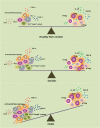Role of Regulatory T Cells in Disturbed Immune Homeostasis in Patients With Chronic Obstructive Pulmonary Disease
- PMID: 32411140
- PMCID: PMC7198877
- DOI: 10.3389/fimmu.2020.00723
Role of Regulatory T Cells in Disturbed Immune Homeostasis in Patients With Chronic Obstructive Pulmonary Disease
Abstract
Chronic obstructive pulmonary disease (COPD) is a complex chronic disease in which T cell-mediated pulmonary inflammation has been shown to play a key role. Accumulating evidence shows that COPD has many of the characteristics of an autoimmune response. An adaptive immune response directed against lung self-antigens, which are released during the initial innate inflammatory response and are triggered by constant exposure to cigarette smoke and epithelial injury, drives the persistent inflammatory response found in smokers. The development and severity of adaptive inflammation depend on the level of tolerance to self-antigens. For these reasons, the effect of regulatory T (Treg) cells on adaptive immunity in COPD patients is of particular interest and could be targeted therapeutically. The disturbance in immune homeostasis caused by changes in the number or function of Treg cells, which is related to cigarette smoke exposure, may be of importance in understanding the development and progression of COPD.
Keywords: COPD; T-regulatory cells; adaptive immunity; aging; immune homeostasis; smoking.
Copyright © 2020 Hou and Sun.
Figures

Similar articles
-
Cigarette smoke-induced reduction of C1q promotes emphysema.JCI Insight. 2019 May 21;5(13):e124317. doi: 10.1172/jci.insight.124317. JCI Insight. 2019. PMID: 31112138 Free PMC article.
-
Regulatory T-Cell Distribution within Lung Compartments in COPD.COPD. 2017 Oct;14(5):533-542. doi: 10.1080/15412555.2017.1346069. Epub 2017 Jul 26. COPD. 2017. PMID: 28745532
-
Imbalance between subpopulations of regulatory T cells in COPD.Thorax. 2013 Dec;68(12):1131-9. doi: 10.1136/thoraxjnl-2012-201956. Epub 2013 Jun 7. Thorax. 2013. PMID: 23749814
-
Cigarette Smoke-mediated Perturbations of the Immune Response: A New Therapeutic Approach with Natural Compounds.Endocr Metab Immune Disord Drug Targets. 2016;16(3):158-167. doi: 10.2174/1872214810666160927123447. Endocr Metab Immune Disord Drug Targets. 2016. PMID: 27697073 Review.
-
Mechanisms of altered cell immunity and cytotoxicity in COPD.Curr Drug Targets. 2011 Apr;12(4):450-9. doi: 10.2174/138945011794751546. Curr Drug Targets. 2011. PMID: 21194409 Review.
Cited by
-
Reduced frequencies of Foxp3+GARP+ regulatory T cells in COPD patients are associated with multi-organ loss of tissue phenotype.Respir Res. 2022 Jul 2;23(1):176. doi: 10.1186/s12931-022-02099-2. Respir Res. 2022. PMID: 35780120 Free PMC article.
-
The association of systemic immune-inflammation index with lung function, risk of COPD and COPD severity: A population-based study.PLoS One. 2024 Jun 14;19(6):e0303286. doi: 10.1371/journal.pone.0303286. eCollection 2024. PLoS One. 2024. PMID: 38875233 Free PMC article.
-
Inhibiting SIRT-2 by AK-7 restrains airway inflammation and oxidative damage promoting lung resurgence through NF-kB and MAP kinase signaling pathway.Front Immunol. 2024 Jun 24;15:1404122. doi: 10.3389/fimmu.2024.1404122. eCollection 2024. Front Immunol. 2024. PMID: 38979411 Free PMC article.
-
The clinical association of programmed death-1/PD-L1 axis, myeloid derived suppressor cells subsets and regulatory T cells in peripheral blood of stable COPD patients.PeerJ. 2024 Mar 27;12:e16988. doi: 10.7717/peerj.16988. eCollection 2024. PeerJ. 2024. PMID: 38560459 Free PMC article.
-
Chronic Exposure to the Combination of Cigarette Smoke and Morphine Decreases CD4+ Regulatory T Cell Numbers by Reprogramming the Treg Cell Transcriptome.Front Immunol. 2022 Apr 20;13:887681. doi: 10.3389/fimmu.2022.887681. eCollection 2022. Front Immunol. 2022. PMID: 35514978 Free PMC article.
References
Publication types
MeSH terms
LinkOut - more resources
Full Text Sources
Medical

